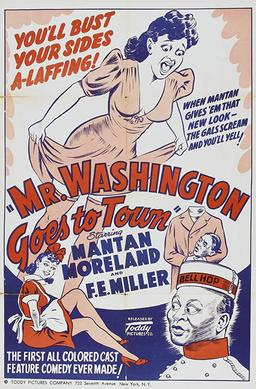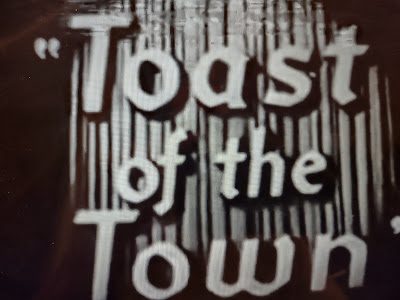Anyone used to Douglas Fairbanks, Jr. as a suave swashbuckler with the vaguely continental accent will likely find Success at Any Price a little shocking. Not only is his character unlikeable, his Lower East Side punk delivery is spot on. Just the way he chews gum at work is a key to his character. He's thoroughly convincing as an amoral louse who will do anything make dough but doesn't realize he's losing his soul until it's almost too late. (A tacked-on scene in the closing seconds, likely ordered by the studio, had me booing the screen.)
The rest of the cast is fascinating, too, for various reasons. Casting former silent screen star Colleen Moore as Sarah was odd; at 35, she's obviously a decade older than Fairbanks. At least Genevieve Tobin as Agnes is supposed to be older (she's 35 but appears at least 40). Agnes, you see, has no interest in the immature Joe, but cynically agrees to marry him for a million dollars. Frank Morgan does a good job as Joe's boss; he plays it straight, years before becoming a self-caricature. And it's always amusing to see Edward Everett Horton in love with a woman as he is here.
If Success at Any Price seems to burn down capitalism, you can thank its writer John Howard Lawson, a genuine card-carrying member of the Communist party, and later one of the infamous Hollywood Ten. Why were Commies drawn to the glamorous, capitalistic world of Hollywood anyway?
BONUS POINTS: In a not-so in-joke, the bartender seen twice sullenly shaking cocktails is played by Arthur Houseman, who was better known for portraying drunks.
One of the thousands of low-budget features made exclusively for black audiences, Mr. Washington Goes to Town plays like an extended Three Stooges short. The thin story is merely an excuse to trot out all the standard haunted house gags -- an invisible man, a vaudeville entertainer with a tuxedo-clad gorilla, a body that carries its head under his arm. The only reason there isn't a wolfman is because the producers probably ran out of money.
How meager is the budget? The hotel lobby set appears to have been left over from a cheap monster movie. Much of the score is played on a skating-rink organ. The opening credits misspell Mantan Moreland's first name!
 For all its two-bit silliness -- you like wisecracking parrots, right? -- sooner or later Mr. Washington Goes to Town will win you over, if only because of Mantan Moreland, the funniest of the 1940s black movie comedians. (He's great as the chauffeur in the otherwise unwatchable Charlie Chan movies at Monogram.) The routines he and stage partner F.E. Miller (as Wallingford) share here are so engaging that you eventually lose any reservation about enjoying allegedly "problematic" jokes. (The actors' delivery and dialogue is little different from that of the reviled Amos 'n' Andy.) I mean, if you don't think "Uh oh" is funny, you haven't heard Mantan Moreland say it.
For all its two-bit silliness -- you like wisecracking parrots, right? -- sooner or later Mr. Washington Goes to Town will win you over, if only because of Mantan Moreland, the funniest of the 1940s black movie comedians. (He's great as the chauffeur in the otherwise unwatchable Charlie Chan movies at Monogram.) The routines he and stage partner F.E. Miller (as Wallingford) share here are so engaging that you eventually lose any reservation about enjoying allegedly "problematic" jokes. (The actors' delivery and dialogue is little different from that of the reviled Amos 'n' Andy.) I mean, if you don't think "Uh oh" is funny, you haven't heard Mantan Moreland say it.
BONUS POINTS: Black actor Charles Hawkins in his brief role as a lawyer named Goldberg, speaking with a Yiddish accent. Now that had me busting my sides a-laffing.
TOAST OF THE TOWN (12/18/1949): So associated is Ed Sullivan with the
American debut of the Beatles that it's easy to forget his program, originally titled Toast of the Town, had already been on the air 16 years. While here Ed is, of course, younger and dressed in his finest 1949 duds, he's only slightly less awkward than the livelier-than-average zombie he would later become famous for.
In addition to the usual guests you'd expect -- acrobats, comics, singers, dancers -- a few others stand out. In a brief salute to old pop music, songwriters Harry Armstrong and Maude Nugent bellow "Sweet Adeline" and "Sweet Rosie O'Grady", which they each respectively wrote in 1896! Just as mindboggling is the legendary W.C. Handy playing his classic "St. Louis Blues" -- it's like a time machine within a time machine.
Now, it wouldn't be a Sullivan show without something "for the youngsters". But since this is several years before rock & roll, they had to make do with an eight year-old girl lip-synching to a Judy Garland record, and Tommy Trent's astonishingly violent Punch-and-Judy puppet act. The audience gasps more than laughs as Punch relentlessly beats up his wife and stretches their baby to the literal breaking point. I guess it's kind of funny in a shocking way, and it's definitely impressive that Tommy manipulates five puppets in all. Just don't expect to see this kind of thing at kids' birthday parties anymore.
It should be noted that both the aforementioned W.C. Handy and comic impressionist George Kirby were likely the only African-American entertainers on TV that week; many Americans must have blown their tops when the very white Ed Sullivan shook Kirby's very black hand in 1949. Sullivan would showcase black entertainers on an almost weekly basis for close to a quarter-century. It made up for violently misogynistic puppets.
BONUS POINTS: The commercials for Lincoln-Mercury, the cars not much smaller than your typical SUV, which mention every aspect of the products except what must have been the ridiculously low gas mileage rate.
***********
.jpg)

.jpg)





No comments:
Post a Comment